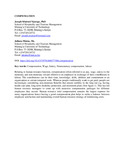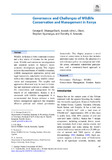Books & Book Chapters (THM)
Browse by
Recent Submissions
-
Tourism Adaptation Frameworks for Climate Change: A Review
(De Gruyter, 2021-07)Tourism is one of the fastest growing industries globally. It has continued to record an average of 3.5–4% despite the global challenges experienced in the last decade including the latest COVID-19 pandemic (UNWTO, 2020). ... -
Natural Ecosystem
(Elgaronline, 2022)Relating to human resource function, compensation (often referred to as pay, wage, salary) is the monetary and non-monetary reward offered to an employee in exchange of their contribution to labour. The contributions can ... -
Staycation motivation
(2022-07)Staycation is largely associated with “vacationing at home”. It is coined from the words: ‘stay’ and ‘vacation’. The blending combines initial segment of the first word “stay” with final segment of the other “cation”. The ... -
Maladaptation
(2022-07)Climate change remains one for the greatest challenge facing humanity in the 21st century and beyond. Whereas the impact of climate change cuts across all sectors of the economy climate sensitive industries like tourism ... -
Bleisure typologies
(2022-07)The origin of tourism dates back to the end of the 18th century when the western tradition organized travels to support infrastructure and sight-seeing in the cities of ancient Greece and Rome. In the 21st century modern ... -
Compensation
(2022-07)Relating to human resource function, compensation (often referred to as pay, wage, salary) is the monetary and non-monetary reward offered to an employee in exchange of their contribution to labour. The contributions can ... -
Sustainable Adaptation
(2022-07)Sustainable-adaptation is defined as adaptation measures and strategies aimed to reduce vulnerability and enhance resilience of an individual, society or system without compromising social justice and environmental integrity ... -
Immovable cultural heritage
(2022-07)Cultural heritage expresses the way of life of a community over generations. It answers questions through research and archives of the remains of the past for scientific and historic purposes. Cultural heritage has survived ... -
Climate Change and Immovable Cultural Heritage in Kenya: Impact and Response Strategies
(Springer, Cham., 2021)Immovable cultural heritages represent past human life that links the past, present, and future landscapes. Protection and preservation of authenticity and integrity of these built heritages is a major challenge in the ... -
Governance and Challenges of Wildlife Conservation and Management in Kenya
(Springer Nature Switzerland, 2021)Wildlife in Kenya is both a national resource and a key source of revenue for the government. Wildlife and tourism are interdependent and essential sectors in Kenya’s socio-economic development agenda. This chapter reviews ... -
Business Travel and Tourism
(2015-11-05)The book has been structured in, what we hope the reader will agree, is a logical manner. In Part One, the authors define business travel and tourism and talk a little about its historical development. They identify the ... -
BUSINESS ECONOMICS AND MANAGERIAL DECISION MAKING
(2015-11-05)Firms are major economic institutions in market economies. They come in all shapes and sizes, but have the following common characteristics: g Owners. g Managers. g Objectives. g Apoolofresources(labour,physicalcapi ... -
British Tourism: The remarkable story of growth
(2015-11-05)Demand for domestic and international travel has been increasing rapidly among the British population over the last half-century. From the summer season attractions ofseaside resorts in the 1950s to modern gap year ... -
Beach Management Principles & Practice
(2015-11-05)T his book on beach management was wri�en in order to provide a counterbalance to the many excellent books associated with beach management that emphasize coastal engineering and the variety of techniques associated ... -
THE BASICS OF ECONOMICS
(2015-11-05)Since the dawn of civilization, people have groped for answers to the basic economic questions of what, how, and for whom to produce. How people chose to answer these universal questions shaped the course of history, ... -
Backpacker Tourism Concepts and Profiles
(2015-11-05)This is the second volume of the ongoing research programme on backpacking developed by the Backpacker Research Group (BRG) of the Association for Tourism and Leisure Education (ATLAS). The BRG aims to act as a platform ... -
Aviation and Tourism Implications for Leisure Travel
(2015-11-05)It may not be immediately obvious why three academics from different parts of the world (namely United Kingdom, Greece and Australia) would want to join forces in editing this book. The answer is very simple. We have ... -
Atlas of Travel and Tourism Development
(2015-11-05)The geography of travel and tourism as it is taught today is destination-focused, with students able to avail themselves of excellent textbooks which examine the geography of demand and present a balanced view of des-tination ... -
Architecture and Tourism Perception, Performance and Place
(2015-11-04)The humanistic and social scientific study of tourism has an intriguing history. The largest peacetime movement of human beings in human history and a leisure time activity of the vast majority of academics, tourism, ... -
An Introduction to Tourism
(2015-11-04)Tourism is now recognized as being an economic activity of global significance. As the importance of the activity has increased, so too has the attention given to it by governments, organizations in both the public ...




















